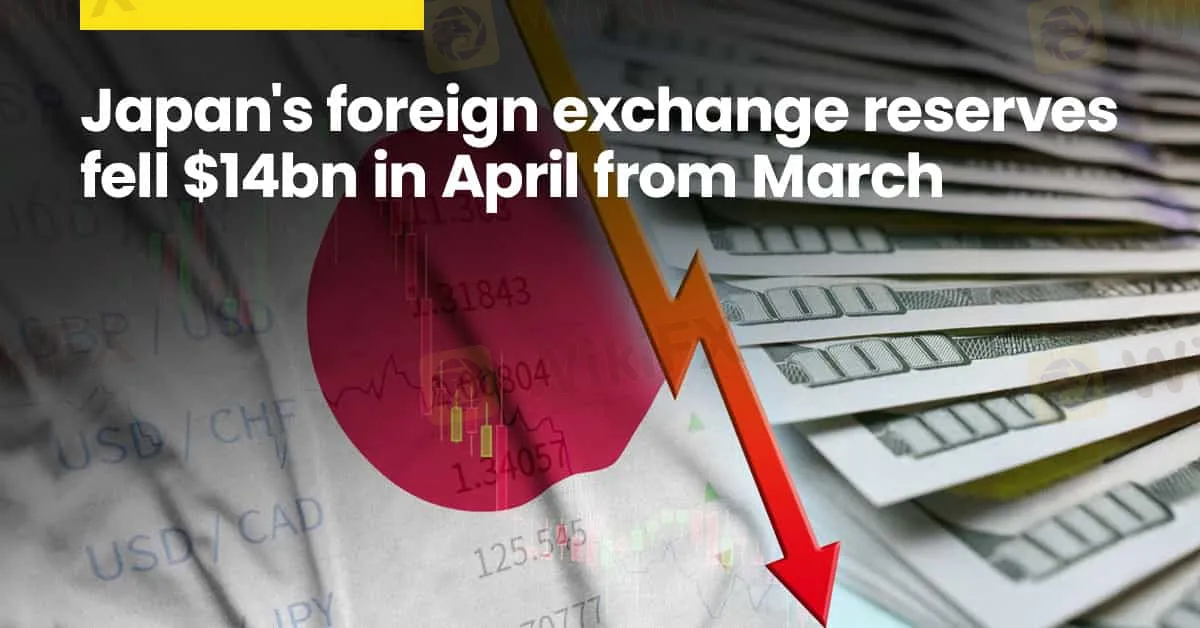简体中文
繁體中文
English
Pусский
日本語
ภาษาไทย
Tiếng Việt
Bahasa Indonesia
Español
हिन्दी
Filippiiniläinen
Français
Deutsch
Português
Türkçe
한국어
العربية
Japan's foreign exchange reserves fell $14bn in April from March
Abstract:In April, Japan experienced a significant decline in its foreign currency reserves, with a drop of $14 billion largely attributed to the decrease in the value of foreign securities holdings.

In April, Japan experienced a significant decline in its foreign currency reserves, with a drop of $14 billion largely attributed to the decrease in the value of foreign securities holdings.
According to a finance ministry report released on Thursday, Japan's forex reserves fell to $1.14 trillion in April. This decline was primarily driven by a decrease in holdings of foreign securities, which decreased from $995 billion to $978 billion compared to the previous month. The decrease in securities holdings was anticipated due to a drop in the market value of overseas assets, including Treasuries, as yields rose.
This data follows speculation that Japan intervened in the market twice to support the yen, with the first intervention occurring at the end of April. While Japanese officials have not confirmed any intervention, a Bloomberg analysis of the central bank's current account suggests that the nation likely entered the market twice last week. The estimated amount of yen bought during the first action is approximately ¥6.2 trillion ($40 billion), based on updated data and money broker estimates.
Japanese officials have consistently maintained a strategy of neither confirming nor denying intervention, leaving investors to infer market moves. Finance Minister Shunichi Suzuki and his deputy declined to confirm any interventions when questioned by reporters last week and earlier this week, respectively.

Disclaimer:
The views in this article only represent the author's personal views, and do not constitute investment advice on this platform. This platform does not guarantee the accuracy, completeness and timeliness of the information in the article, and will not be liable for any loss caused by the use of or reliance on the information in the article.
Read more

Space World Capital - The Forex Broker You Should Not Partner with
Explore this guide to know the scam of Space World Capital, which does not hold a regulatory license to operate forex business.

Crypto Craze Fizzling Out? Here is Why
The Crypto Craze among users is fading out. The wave of Cryptocurrency has slowed down. But what are the major reasons why this has happened?

Social Trading Goes Mobile at M4Markets
A new mobile application for social trading has been launched through a collaboration between brokerage firm M4Markets and fintech provider Brokeree Solutions

Forex Trading in Malaysia: Is It Halal Under Islamic Finance?
Forex trading has become increasingly popular around the world as a way to invest and manage currency risks. In Malaysia, where a large part of the population follows Islam, many traders often ask whether forex trading is halal or haram under Islamic law.
WikiFX Broker
Latest News
WikiFX Gala Night Malaysia Concludes Successfully
IG Group Unlocks Over £425 Million amid a Capital Reduction
Gold Prices Fall by INR 39,300 in the Last Week? What's Next Week's Outlook?
Treasury yields tick lower as Trump's spending bill in focus
Ripple and SEC Drop Appeals, Bringing 5-Year Legal Saga to a Close
Scam Alert: 5 Key Reasons to Avoid BazaarFX at All Costs
German inflation unexpectedly falls to 2% in June, hitting ECB's target
Can Your Financial Literacy Protect You from Scam Brokers?
44-year-old CEO: This No. 1 trait separates the best employees from most other people—'I didn't get here' without it
Oracle stock jumps after $30 billion annual cloud deal revealed in filing
Currency Calculator


